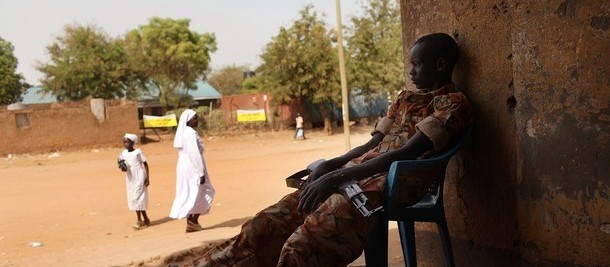South Sudan’s new Minister of Interior has declared a “war on crime” and called for police reform in the wake of a leadership meeting held in Wau.
Aleu Ayen Aleu, who took office at the beginning of the month, formerly chaired the security committee in the National Assembly. He made remarks to journalists at Juba Airport on Sunday upon arrival from a police leadership conference in Wau in Westen Bahr el Ghazal State.
His arrival coincided with a police action yesterday against protesters near Juba Teaching Hospital. The protesters were angry about the rising tide of crime in Juba, and specifically the murder of two citizens by armed robbers on Saturday night.
Aleu revealed in his remarks that the police leadership conference resulted in the adoption of a number of resolutions in order to transform the police service across South Sudan and tackle insecurity in major cities. He said that the purpose of the conference was to transform the police and shape it as a capable service that can maintain security in the country.
The minister pointed to the mandate he has received directly from the president, saying that he was instructed to deliver on orders from the president within three to six months. “As you know I have just been appointed as Minister of Interior – the President of Republic has directed me that service delivery should be within three to six months,” he said.
Emphasis on community policing
Aleu remarked that the leadership conference stressed on ‘community policing’, which has also been a focus of international donor interest. The idea is that strong relations between the police and the citizens can improve security.
“We exhaustively discussed on the importance of strong relations between the police and citizens, therefore we came up with the idea of community policing. This police shall give the public their constitutional rights to be partners in security keeping,” said the official.
He added that the conference came up with how best to develop local partnerships with the stakeholders including working with international partners particularly with UNMISS, UNDP and other donors.
The minister noted also that the conference reflected on the vision, mission and goals of the police service. “The vision is that we need South Sudan to be a place where citizens carry out their activities without intimidation, violence and abuses through building strong confidence,” he said.
By the year 2015, he said, the policeman should be seen as a “symbol of protection.”
“We adopted core values in that conference: our mission will focus on combating crimes to maintain law and order. The values adopted in the conference were the respect of human rights and fair treatment to the citizen. Secondly is the honesty which is disengagement from any form of corruption. Thirdly is paying attention to the vulnerable groups especially women and children, and the police should be transparent in what they do and accountable,” he said.
He added that they developed an “action plan” of one year to be applied at national and state levels including reviewing all policies of the Ministry of Interior and police, as well as enactment of the police bills. He disclosed that the leadership of the police service sent to the parliament bills that will govern their work, and that his ministry aims to send to the parliament the traffic bill, fire arms bill, and private security companies bill.
The minister also mentioned three priority areas as part of a security plan for the country. He said that the leadership meeting had identified these as Juba, Jonglei State, and the tri-state area at the borders of Unity, Lakes and Warrap.
‘The battle against crime has started today’
“I announce that the battle against crime has started today and I appeal to the public to assist the law enforcement agencies in this war against crime,” Aleu said. “I announce that any criminal in uniform should be apprehended and brought to book,” he added.
He underscored that the fight against criminals cannot be won by appointment of ministers, pointing to the need for discipline within the police, intensive training, and evaluation of the existing forces.
Last month 17 police brigadiers were removed by presidential decree. Aleu suggested that another purge may be coming. “Big ranks within the police now will be arranged – we will get solutions for those who cannot be trained,” the minister hinted.




